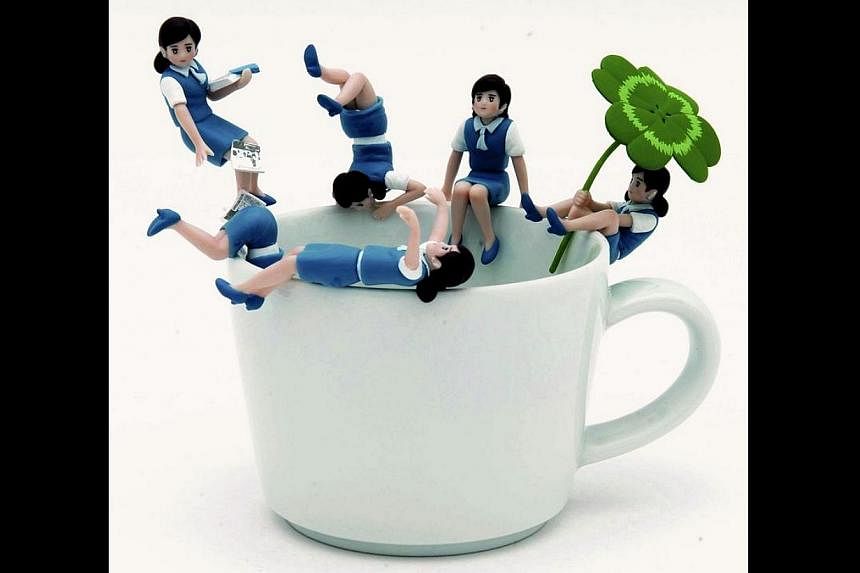TOKYO (YOMIURI SHIMBUN/ASIA NEWS NETWORK) - Insert one or a few coins into the vending machine, turn its lever, and into your hands will fall a little plastic ball with a toy inside.
The toys and the machine that contains them are both called "gacha-gacha", a Japanese word based on the sound made when turning the lever. The machines are usually installed around stations and at major retail outlets. Each machine usually contains several versions of a toy, and you never know which version you will get.
Although many gacha-gacha toys were mainly meant for children in the past, well-designed or humorous products geared toward adults have started gaining in popularity in Japan.
One example is a little plastic figurine of a young woman wearing a typical office uniform who is built to sit on the edge of your coffee cup, dangle from it, do a headstand on the edge of it, or strike some other amusing pose. More than 6.5 million of the approximately 5-cm-tall resin figures, called "Koppu no Fuchiko" (Fuchiko on the edge of the cup, with Fuchiko being the woman's name) and costing 200 yen (S$2.45) each, have been sold since they first appeared for sale in July 2012. Gacha toys are considered successful if sales reach 200,000 pieces.
In June, a CD recording of the product's official song was put on sale, and Tokyo MX TV station began broadcasting a programme titled "Onsen no Fuchiko," in which Fuchiko introduces hot spa resorts across the nation.
According to Kitan Club, the toy maker that sells the little figurines, the pre-sale response from wholesalers to the product was not great. It became popular among social networking service users, however, as they posted comments praising it as "cute", "interesting" and "relaxing".
The product is particularly popular among women in their 20s and 30s, Kitan Club said.
Gacha-gacha toys were first conceived in the United States, and they became prevalent in Japan in the 1970s. The machines initially sold only toys geared toward children, such as erasers based on Kinnikuman (Muscleman), a wrestler with super powers who is featured in manga and anime, and erasers in the shape of supercars. However, when animal and botany figures made in elaborate detail joined the ranks of other toys from the 1990s to 2000s, they became a hit among men.
Industry revenue crossed 30 billion yen in that period. But sales had fallen to 27 billion yen by 2012 due to the lack of a hit product and the declining number of children. However, last year, sales rebounded slightly to 27.8 billion yen. Gacha-gacha toys reportedly have sold well this year, too.
One factor boosting the popularity is the launch of unique, amusing products such as Fuchiko, according to a major toy manufacturer.
Bandai Co. debuted "Nekoze," or figures of hunching cats, in June. The product, which includes 12 designs at 200 yen each, has sold well. The idea for the cats was inspired by a slouching male employee in charge of product planning, who thought it might be fun to depict cats who also slouch.
"Kangaenai Hito" (The thoughtless) was put on sale by T-ARTS Co. in November and has also sold well. The little statues, priced at 200 yen each, are a parody of French sculpter Auguste Rodin's world-famous "The Thinker" and come in six variations featuring the statue in funny poses. One of the six is titled "Kangaenaide Takkurusuru Hito", depicting the statue tackling its pedestal, while another, titled "Kangaenaide Kaikyakusuru Hito," depicts him using the pedestal as a pommel horse.
More recently, T-ARTS Co. launched "Jiyusugiru Megami" (The goddess with too much freedom), based on the Statue of Liberty. The product has six designs and costs 200 yen each.
According to a major toy manufacturer, office workers put these unique gacha-gacha toys on their office desks because they are amusing to look at in the office. Some people collect the figurines, too.

